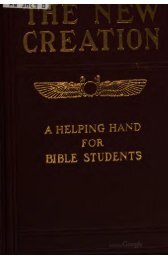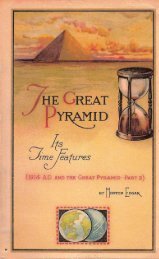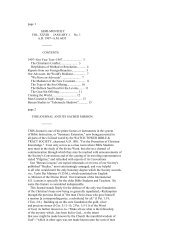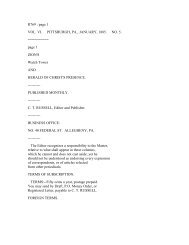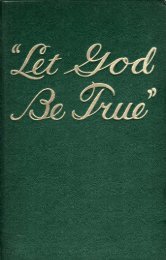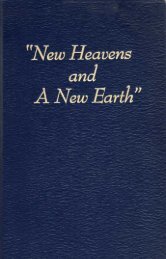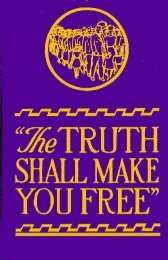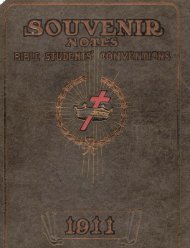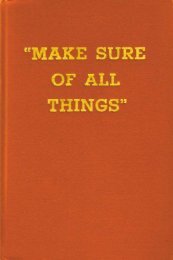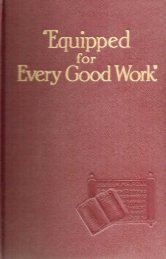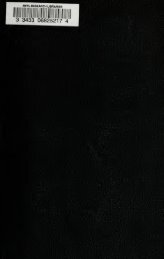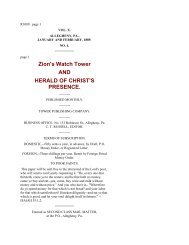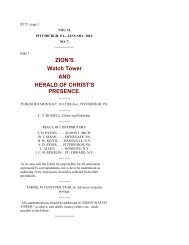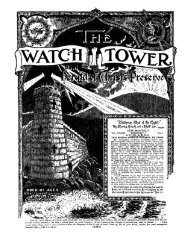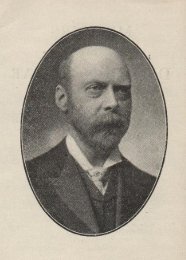1917 Watchtower Bible Student Schism - A2Z.org
1917 Watchtower Bible Student Schism - A2Z.org
1917 Watchtower Bible Student Schism - A2Z.org
You also want an ePaper? Increase the reach of your titles
YUMPU automatically turns print PDFs into web optimized ePapers that Google loves.
2 FACTS FOR SHAREHOLDERS NOVEMBER 15. <strong>1917</strong><br />
holders are not restricteq in voting for Directors to vote for<br />
brethren who reside in Pennsylvania. The Watch Tower<br />
Society is not o religious Society for public worship, such<br />
as a Church, but is a business corporation, not for profit,,<br />
and statutes requiring religious corporations of that nature<br />
to have three Directors in Pennsylvania do not apply. The<br />
statute requiring one-third of the Directors of certain companies<br />
to live in that State does not apply to the Society, and<br />
section six of the corporation law, requiring three of the<br />
original subscribers to live in Pennsylvania, does not require<br />
the Society to have three local Directors.<br />
THE RIGHT TO VOTE<br />
The right to vote is a Charter right, and such right cannot<br />
lawfully be taken away by means of a by-law ! A by-law may<br />
be made regulatilf~ the right to vote, but may not take away<br />
that right.<br />
It is unlikely that enough people would desire to vote as to<br />
the management of the Society, having the right to do so,<br />
who are not believers in the Present Truth to make them<br />
dangerous to the Society; nevertheless, recognizing the spirit<br />
of the by-law (which the President of the Society says exists),<br />
prohibitin2 those out of harmony with the Society from<br />
voting, we advise that all who conscientiously believe themselves<br />
in har~t~olty m'th the purposes which have been set<br />
forth for wars on . bare - two of "The Watch Towe under<br />
;he cabtioli, ."This Journal and 'its Sacred Mission," are fully<br />
quulified to vote at the election within the spirit and letter<br />
of the bjl-!mu, and to answer "yes" to the question on Proxy<br />
furnished with the Nov. 1, <strong>1917</strong>, TOWER.<br />
Such may, of course, also conscientiously say that they believe<br />
the Society is the Lord's agent in the execution of the<br />
Harvest work, until the shareholders themselves decide at<br />
some time in the future to change the policy of the Society.<br />
Surely, one man such as Bro. Rutherford cannot be the Society,<br />
and all the shareholders the followers of his will or<br />
cajolery, unless they decide for themselves to do so, and unless<br />
they have so decided, and they cannot do so until Jan. 5,<br />
1918, by a shareholders' vote at the Annual Meeting-because<br />
they are the Society!<br />
The Society has a right to close its books a reasonable<br />
time before election (viz., Dec. 14 <strong>1917</strong>1, so as to enable<br />
the Secretary to ascertain how many votes each one is entit!ed<br />
to cast; but the Society has no right to say that no<br />
one may vote unless the Secretary endorses him and says<br />
he may do so.<br />
The Secretary must be prepared at the place of election<br />
with a voting list and the books of the Society. The 'books<br />
are the test of the right to vote as of the 10th day of De-<br />
cember. -411~ one can see that this is true, because if a person<br />
votes personally he will go to the meeting and not send<br />
himself to Bro. Van Amburgh at Brooklyn on Dec. 10, <strong>1917</strong>.<br />
He could not be required, either, to send his Proxy to Brook-<br />
lyn. 'rhc Inspectors may at the meeting check his right to<br />
vote as the books stood on Dec. 10 previously.<br />
l!ad the certificates been sent out as they were last year,<br />
the voting would have been more simple. The method now<br />
suggested will work, if adopted, to take the control from the<br />
friends.<br />
The friends all know how many votes they were entitled to<br />
last year arid how much more they have donated since then,<br />
and so each knows the shares he or she may vote.<br />
The Classes, if they adopt the suggestion in the Nov. 1,<br />
<strong>1917</strong>, "Watch Tower," will vote to suggest their preferences<br />
on Nov. 21, <strong>1917</strong>. This Class-vote of those professing con-<br />
secration has zothi~g to do legally with the Society. No one<br />
is a nzember of the Society except he has voting shmres. The<br />
Society is a business corporation, not for profit, and is a<br />
creation of the law of Pennsylvania, and is not (legally) a<br />
religious corporation !<br />
There possibly is no objection to sending the Proxy to<br />
Brooklyn to be checked by the Secretary, but if a Brother<br />
or Sister does not receive his Proxy again in time to deliver<br />
it to the brother who expects to go to the Annual Meeting<br />
froin his own Class or county or State, he may execute a<br />
new Proxy and date it later than the earlier one, and the<br />
later will be the lawful one, and the Inspectors of Election<br />
should so decide.<br />
It will be entirely proper for all the consecrated in the<br />
Present Truth to answer "YES" to the question on the Proxy,<br />
as the President has no right to impose such o condition in<br />
szish a ze$ay; and he is not the Society--or Channel!<br />
It looks like a studied effort to exclude any from voting<br />
who do not agrce u.itlz the three principal brethren who have<br />
subverted affairs by force and craft.<br />
INSPECTORS OF ELECTION<br />
The law requires that the ballots be taken by Inspectors of<br />
Election. The law requires that they make oath to execute<br />
the office properly. These Inspectors should be selected by<br />
the vote of the Shareholders present, voting either in person<br />
or by Proxy. The Inspectors must receive the vote and do<br />
the deciding. The books must show who may vote and how<br />
many shares. If any Shareholder is able to demonstrate to<br />
the Court of the State of Pennsylvania that the Election is<br />
to be conducted fraudulently or by force, the law provides that<br />
he may apply by Bill in Chancery to the Court to designate a<br />
Master in Chancery to conduct the election. It might be well<br />
for the friends to select two lawyers, brethren, to act as Inspectors<br />
of Election, or one lawyer and another brother, but<br />
both, of course, should be disinterested personally.<br />
There Were No Vacancies in the Board of the W. T. B. &<br />
T. Society-Hence There Was No Room for<br />
New Directors<br />
"Harvest Siftings," No. 2 (page I), states that the four<br />
Directors were not legal members of the Board. This statewzent,<br />
we believe, to be untrue. In fact, we are scrre it is<br />
fintrue!<br />
The Pennsylvania statute holds that "in case of the death,<br />
removal or resignation of the President or any of the Directors,<br />
Treasurer or other officer of any such company, the<br />
remaining Directors may supply the vacancy thus created,<br />
untzl the nest election."<br />
The Pennsylvania Courts have held that "Directors uppointed<br />
to fill vacancies hold zmtil their slrccessors are<br />
elected!"<br />
Bro. Rutherford states in the Nov. 1, <strong>1917</strong>. "11-atch Tower"<br />
(page 328, col. 2, par. 2 and 3) that after the original Board<br />
of Directors was chosen (in 1884) there never was an election<br />
of Directors. He says "Successors to those original Directors<br />
were ne;cr electcd by the shareholders."<br />
The Pennsylvania Courts have expressly held that as the<br />
statute in that State provides that the Directors or Trustees<br />
shail be chosen annually by the stockholders or members at<br />
the time fixed by the by-laws and shall hold their office until<br />
others are chosen and qualified in their stead, that that means<br />
until an election for Directors has been held.<br />
The case of Pennsylvania Milk Producers' Assn. vs. First<br />
Natl. Bank (20 Pa. C. C. 540) expressly holds that "Directors<br />
appointed to fill vacancies hold until their successors are<br />
elected."<br />
The Courts of Pennsylvania hold that Directors hold over<br />
tutti1 an actual valid election takes place, even though the<br />
tiiize f ~ the r electiolr for Directors may have passed by.<br />
It is general, also, in the various States that "hold-over"<br />
Directors may hold meetings, fill vacancies in the Board and<br />
vole to sell property, the same as though regular elections<br />
had been held. (See Kent Co. Agricul. Society vs. Houseman,<br />
81 Mich. 609.)<br />
The text books, too, on the subject say that the old Directors<br />
continue in office until their successors are duly<br />
elected. (See Cook on Corporations, 7th Ed., Sec. 624.)<br />
Section 61, act of 1891, of the Penna. Corporation Law says<br />
that "the Directors shall be chosen annually at the time fixed<br />
by the by-laws, and shall hold their office until others are<br />
chosen and qualified in their stead. Hold-over Directors must<br />
perform the duties enjoined by the law as regularly elected<br />
Directors. (See Kenard vs. Wood, 130 Pac. R., 194; Cook<br />
on Corp., Sec. 713, 7th Ed.)<br />
The fact that these hold-over Directors were appointed by



